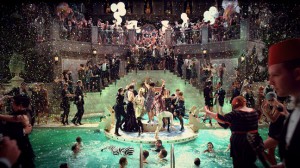A brief history of the Great Gatsby in film By Richard Crouse Metro Canada – In Focus May 8, 2013
 F. Scott Fitzgerald’s novel The Great Gatsby is one of the best-known novels of the twentieth century. Dubbed one of the two best books of the century by The Modern Library these days it may be most familiar as the movie that reestablished Vincent Chase’s career on the show Entourage.
F. Scott Fitzgerald’s novel The Great Gatsby is one of the best-known novels of the twentieth century. Dubbed one of the two best books of the century by The Modern Library these days it may be most familiar as the movie that reestablished Vincent Chase’s career on the show Entourage.
On that HBO series Chase (Adrian Grenier) was a fast-fading movie star until Martin Scorsese cast him in a movie based on the book. That fictional film became a big hit and put Chase back on top of the Hollywood heap.
This weekend The Great Gatsby comes to the big screen for real when Moulin Rouge! director Baz Luhrmann unleashes a 3D version of the story starring Leonardo DiCaprio and Carey Mulligan.
It’s not the first time the life and times of doomed Jazz Age millionaire Jay Gatsby has been filmed for the screen.
In 1926, just one year after the book was published, a silent movie starring William Powell, appeared. The movie was popular with audiences but at least two paying customers weren’t impressed.
Scott Fitzgerald and wife Zelda walked out of a screening and later Zelda, incensed, wrote to her daughter, “We saw The Great Gatsby in the movies. It’s rotten!”
A 1949 film noir version spun the story to fit its lead actor. Movie tough guy Alan Ladd–he’s billed as Ladd – Man of Violence and Mystery–stars in a cautionary tale about learning “the hard way about the wages of sin.” To play up to Ladd’s core audience he’s seen firing a machine gun in a story that focuses on Gatsby’s violent history as a bootlegger.
Despite Ladd’s fame and passion for the project–he personally convinced Paramount to make the film–the movie was not a success, and was eventually withdrawn by the studio. To this day it’s still hard to find a copy.
The most famous version to date starred two of the biggest stars of the 1970s, Robert Redford and Mia Farrow. Working from a script by Francis Ford Coppola–who lived in F. Scott Fitzgerald’s home while he wrote the screenplay–the movie stays true to the novel. Embellished by beautiful set design and lush costumes, it’s a treat for the eyes, but received tepid reviews. The New York Times wrote, “the movie itself is as lifeless as a body that’s been too long at the bottom of a swimming pool.”
